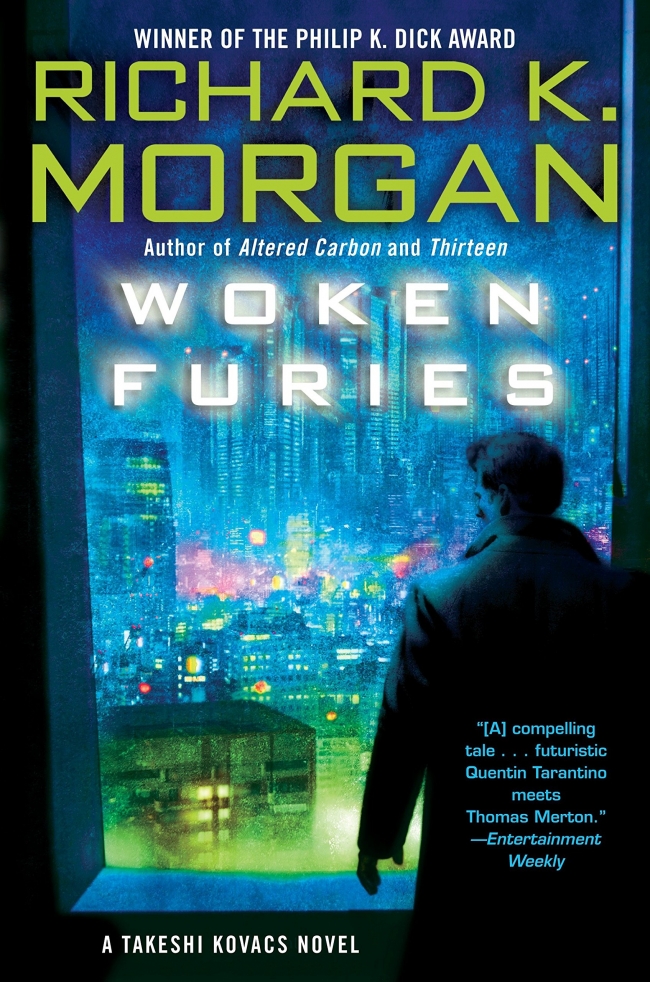The premise of the book is Takeshi Kovacs is unsleeved on Harlan's World after the events of Broken Angels. Having returned to his ocean-covered half-Japanese, half-Russian world, he has to deal with culture shock from the way his home has become overrun with religious fanatics as well as the way the rights of the poor have been nibbled away by the upper classes. This is while he is consumed by a murderous blood that has driven him to commit unimaginable atrocities on hundreds, if not thousands of people.
The end of the Takeshi Kovacs trilogy comes neither with a bang nor a whimper. For me, it reminds me of Indiana Jones and The Last Crusade. Like Raiders of the Lost Ark, Altered Carbon was the best of the series while Broken Angels did something different but was kind of a disaster (much like Temple of Doom). Indiana Jones and the Last Crusade returned to the formula of Raiders, much like Woken Furies does with Altered Carbon, but doesn't quite capture the same magic. Or have I completely lost myself with this metaphor?
Joining up with a mercenary unit, he discovers a woman has become "possessed" for all intents and purposes by Quellcrist Falconer. Quellcrist is basically a combination of Che Guevara and Jesus on Harlan's World and her followers are determined to resume the fight they began three hundred years ago against the First Families with Takeshi caught up in the middle. Throw in Takeshi being hunted by his own double-sleeve (effective clone) and you have a very interesting premise. Kind of.
The book largely depends on whether or not you sympathize with Takeshi Kovacs' moral dilemma over whether or not Quellcrist Falconer has actually returned. The problem is, the book does a fairly decent job of making it clear said revolutionary isn't all that impressive and an enormous hypocrite (which Takeshi points out). There's a lot of interesting places which Richard K. Morgan could have gone with the premise like the fact people often lionize people to ridiculous levels while ignoring their flaws or that a past revolutionary plopped in the future probably doesn't have any real insights into the new geopolitical climate. Morgan manages to hint at all of these interesting ideas but then chooses to play the role of King Arthur returned entirely straight. This is an odd thing to do for the book and, ultimately, the least interesting option.
The "Other" Takeshi Kovacs is also a disappointment. Takeshi is being hunted by his own two-hundred-year-younger self. A figure who is, fundamentally, still the same man. However, he's one of the least interesting characters in the books because his personality exists solely to be an angry teenager thinking of "our" Takeshi as a sellout. Some more nuanced scenes where Takeshi talks about the horrors and losses he's suffered seems like it would have been a better use of our heroes' time.
Harlan's World is an interesting new environment for Takeshi to explore and I would have liked to have spent more time there. I was less interested in the Martian technology present and more in the concepts of how the First Families related with the public, the local cultural traditions, plus how the world has changed since Takeshi's return. Sadly, a lot of time is spent on the Martian technology business and we only get bits and pieces of Harlan World's human element.
Fans of grimdark will note Takeshi remains philosophically psychotic. One minor subplot is talking about how Takeshi murdered all of the adults in a village which killed an ex-girlfriend in an honor killing and how he's now working to exterminate the religion. There's an uncomfortable scene also where he lectures a woman about how her religion keeps her oppressed which comes very close to being "women's rights are only what I believe them to be." Which is hampered only by the fact the person he's lecturing is a caricature of a religiously oppressed woman.
In conclusion, Woken Furies is an okay novel but my least favorite of Richard K. Morgan's works. There's a lot of thought provoking ideas but they are buried underneath an unclear center. Takeshi has long since passed the point of being irredeemable (which is part of what makes him so interesting) so confronting the complex ethical questions of war, peace, and revolution are things which he's just not a very good character for. Still, there's a lot of interesting stuff in the book regardless.


